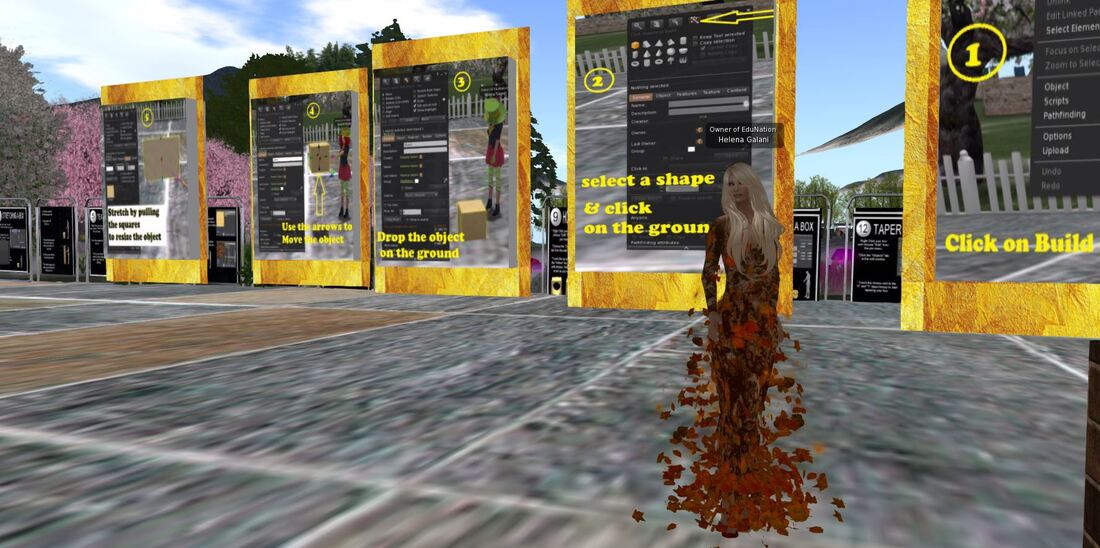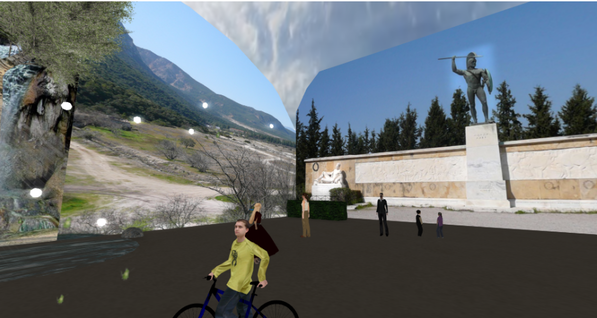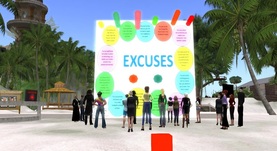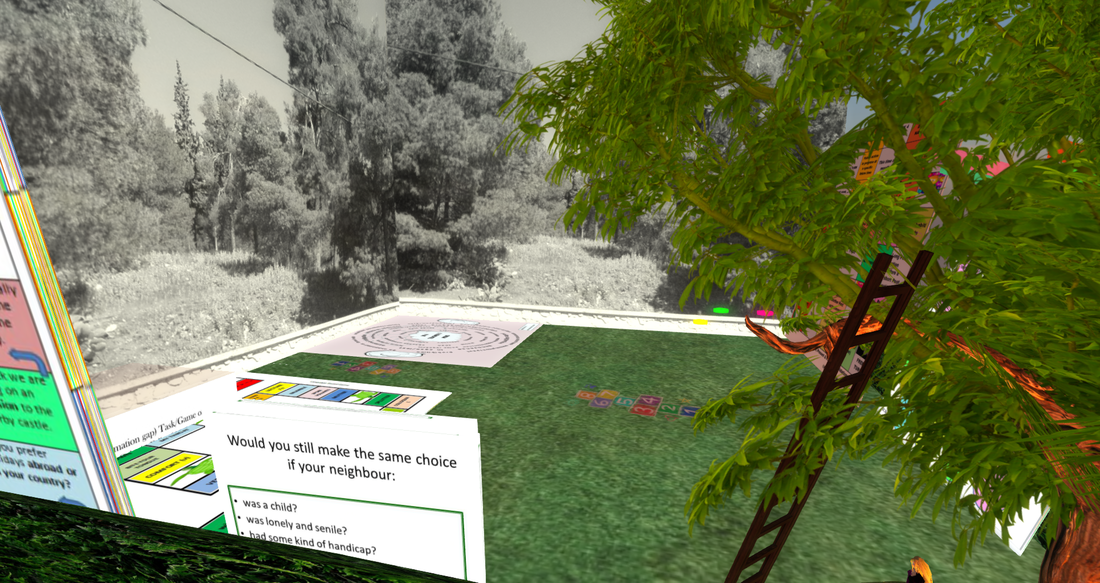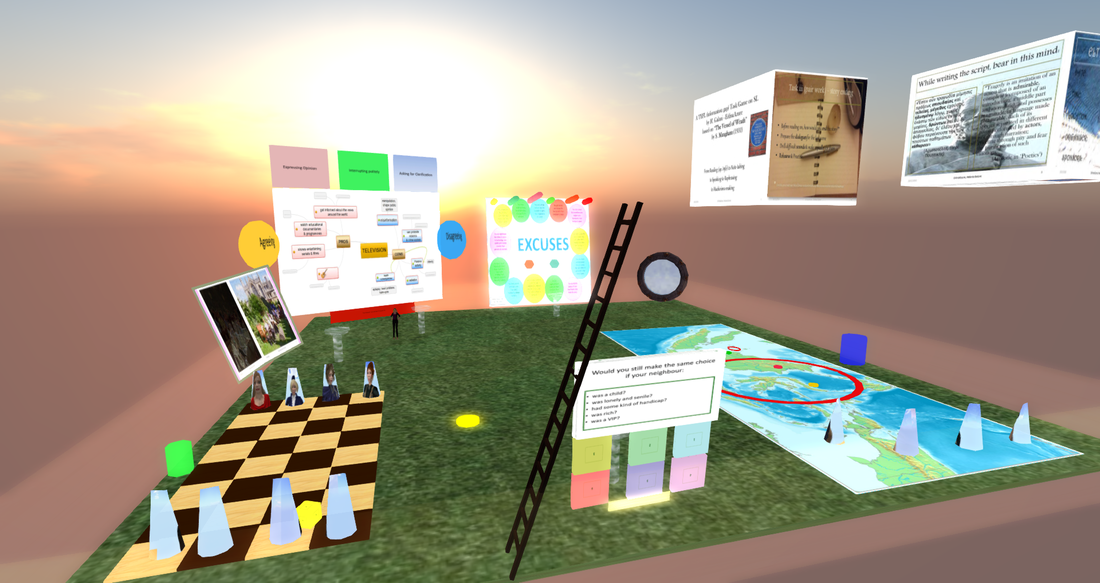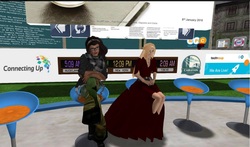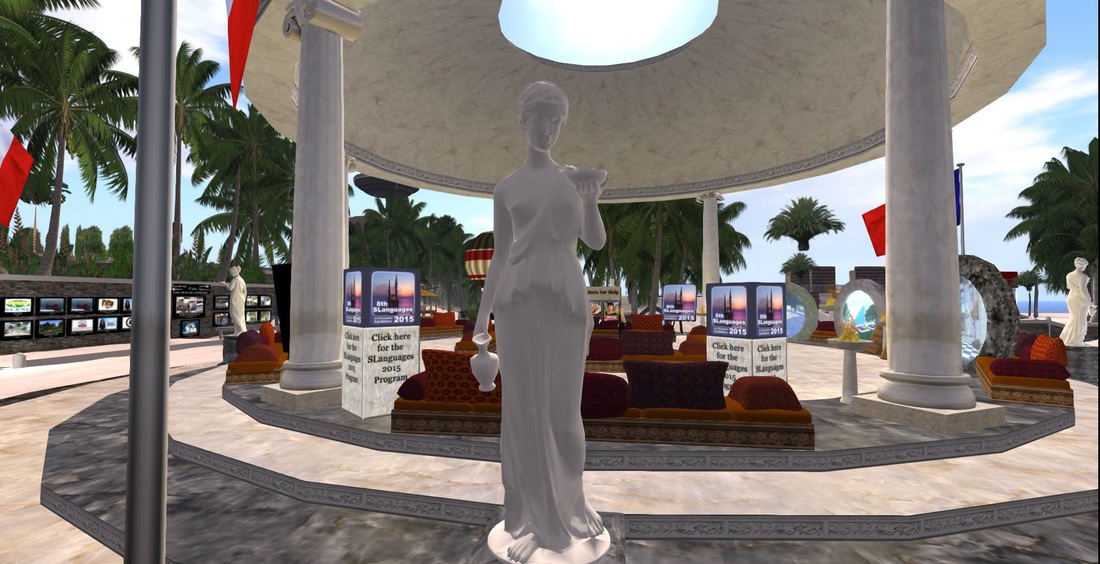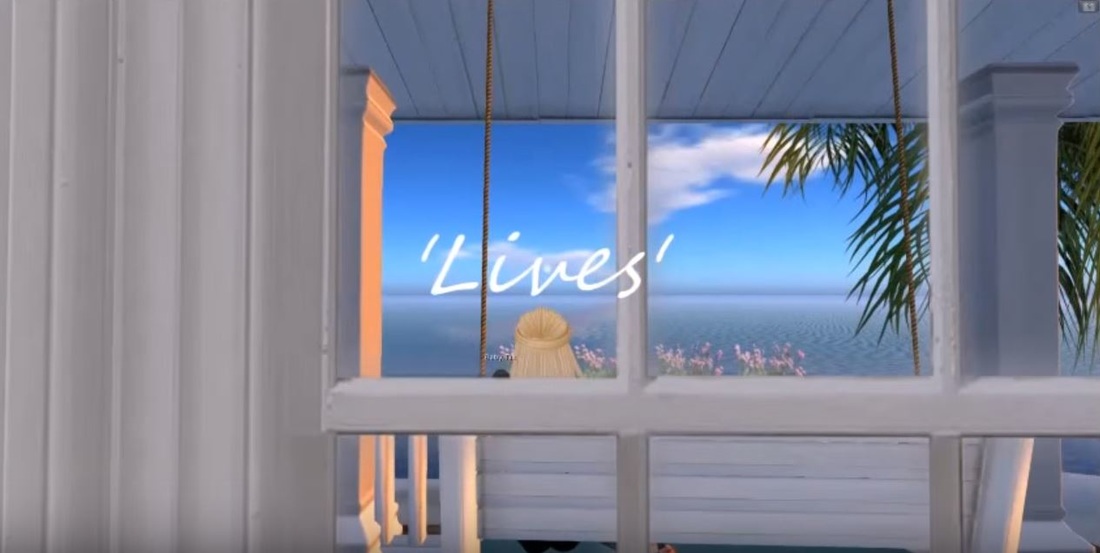Please cite for any content you use from this web page.
Immersive Building in Virtual Worlds and Virtual Reality - EVO Electronic Village online 2022
During this year's EVO Sessions, I trained language teachers on how to:
- Build & shape objects;
- Add texture, sound/media, sit poses, animations (AOs) and script to objects;
- Animesh (in OpenSim)
- Use and make a teleporter
- Adjust the environment settings
- Edit your avatar
with the use of the Workshop Learning Management System, Open Simulator and Zoom.
Transmediality for Immersive Storytelling in Virtual Worlds - EVO 2021
"Wilde & Transmedia Storytelling for 21st century Competencies" is an immersive language learning experience for ESOL learners. This transmedia experience takes place in Kitely, OpenSim, based on Oscar Wilde's selected short stories which are brought to life on my virtual island.
This year, I moderate the sessions on Transmedia Storytelling during Week two on Electronic Village Online 2021.
The workshop focuses on different aspects of Immersive Storytelling and I highlight the usefulness of Transmedia Storytelling for language teaching in Open Sim, Virtual Worlds.
For my part during week II, my teacher training focus is on how to build, how to animesh, add sound, scripts and texture on prims in-world for the purposes of Transmedia Storytelling lessons on Open Sim, Kitely. With the teachers participating in the sessions, we also teleport to ELT Treasure Island and different destinations to find resources for their simulations.
My moderation is based on my teaching experience around Transmedia Storytelling in Virtual Worlds with TESOL learners on ELT Treasure Island, Kitely. Here are some snippets of my recent Project with learners called 'Oscar Wilde & Transmedia Storytelling for 21st century Competencies'. You can find my Teacher Organiser and my article (Galani, 2021) with my reflections on the use of this approach to teaching ESOL.
Transmedia Play encourages learning in different ways. It promotes new approaches to reading, as children must learn to read both written and multimedia texts (across multiple media) and deeply exploring the details of the narrative. It encourages joint media engagement. It can support constructivist learning goals - it involves exploration, experimentation, and remix, with emphasis on the active role of the learner in creating knowledge by working to make connections among information in a specific context (Alper and Herr-Stephenson), here through different Virtual World simulations. (ibid)
For this Project on Open Simulator, Kitely, the learners immerse and interact with objects and the Virtual environment, based on short stories by Oscar Wilde. They revive the stories through a multiplicity of channels, each of them enriching the original story, along the lines of Transmediality as defined by Jenkins. To immerse in the environment of the stories, the learners teleport to different destinations around the island
Electronic Village Online is a series of free and open online sessions on different aspects of Teaching languages. Every year, TESOL experts and participants from around the world engage in collaborative online discussions or hands-on virtual workshops of professional and scholarly benefit.
EVO is a long-standing project of TESOL's CALL-IS.
Heike Philp is lead moderator of this series of Workshops on "Immersive Storytelling in Virtual Worlds" this year.
References:
-Alper, M. and Herr-Stephenson, R. "Transmedia play: Literacy across media.", Journal of Media Literacy Education, vol 5, no. 2, 2013.
-Galani, H. (2021) "Transmedia Storytelling In Virtual Worlds To Promote Language Education"
-Jenkins, H. (2011). "Transmedia 202: Further Reflections." Confessions of an AcaFan.
http://henryjenkins.org/2011/08/defining_transmedia_further_re.html Retrieved: November 9, 2020
This year, I moderate the sessions on Transmedia Storytelling during Week two on Electronic Village Online 2021.
The workshop focuses on different aspects of Immersive Storytelling and I highlight the usefulness of Transmedia Storytelling for language teaching in Open Sim, Virtual Worlds.
For my part during week II, my teacher training focus is on how to build, how to animesh, add sound, scripts and texture on prims in-world for the purposes of Transmedia Storytelling lessons on Open Sim, Kitely. With the teachers participating in the sessions, we also teleport to ELT Treasure Island and different destinations to find resources for their simulations.
My moderation is based on my teaching experience around Transmedia Storytelling in Virtual Worlds with TESOL learners on ELT Treasure Island, Kitely. Here are some snippets of my recent Project with learners called 'Oscar Wilde & Transmedia Storytelling for 21st century Competencies'. You can find my Teacher Organiser and my article (Galani, 2021) with my reflections on the use of this approach to teaching ESOL.
Transmedia Play encourages learning in different ways. It promotes new approaches to reading, as children must learn to read both written and multimedia texts (across multiple media) and deeply exploring the details of the narrative. It encourages joint media engagement. It can support constructivist learning goals - it involves exploration, experimentation, and remix, with emphasis on the active role of the learner in creating knowledge by working to make connections among information in a specific context (Alper and Herr-Stephenson), here through different Virtual World simulations. (ibid)
For this Project on Open Simulator, Kitely, the learners immerse and interact with objects and the Virtual environment, based on short stories by Oscar Wilde. They revive the stories through a multiplicity of channels, each of them enriching the original story, along the lines of Transmediality as defined by Jenkins. To immerse in the environment of the stories, the learners teleport to different destinations around the island
Electronic Village Online is a series of free and open online sessions on different aspects of Teaching languages. Every year, TESOL experts and participants from around the world engage in collaborative online discussions or hands-on virtual workshops of professional and scholarly benefit.
EVO is a long-standing project of TESOL's CALL-IS.
Heike Philp is lead moderator of this series of Workshops on "Immersive Storytelling in Virtual Worlds" this year.
References:
-Alper, M. and Herr-Stephenson, R. "Transmedia play: Literacy across media.", Journal of Media Literacy Education, vol 5, no. 2, 2013.
-Galani, H. (2021) "Transmedia Storytelling In Virtual Worlds To Promote Language Education"
-Jenkins, H. (2011). "Transmedia 202: Further Reflections." Confessions of an AcaFan.
http://henryjenkins.org/2011/08/defining_transmedia_further_re.html Retrieved: November 9, 2020
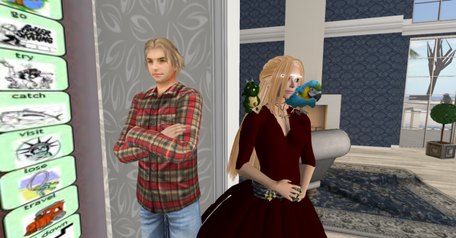 NPGs, with chatbots: Nobody, Coco the parrot and 'Baby Dragon'
NPGs, with chatbots: Nobody, Coco the parrot and 'Baby Dragon'
Electronic Village Online, vLanguages, 2020
Immersive Language Learning in Virtual Worlds, Electronic Village Online,
Moderator & Presenter
11 January 2020 - 16 February 2020
Week 2:
Presenting sample work for Young Learners of English on ELT Treasure Island on Kitely (General) by Helena Galani aka Prof Azure.
(presentation Slides are available here; some pictures and a machinima from ELT Treasure Island.)
"Leveraging the affordances provided in 3D Virtual Worlds, promotes language acquisition and provides meaningful, purposeful, self-determined immersive learning.
Week 3:
Presenting holodeck scenes,in-world books and modifiable bots for NPCs that are used in simulations for English Language Learners on Second Life.
10th Virtual Round Table & 9th vLanguages WebCon,
2018, Presenter
"It's anyone's game: keep it flowing"
Is it feasible to teach language through ELT games in social Virtual Worlds? What parameters and mechanics of game design are taken into account when creating language games in-world? During this presentation, we look at examples and simple ways of ensuring game flow by integrating language pedagogy with virtual world technologies, as an integral part of teaching at all levels of language education.
2018, Presenter
"It's anyone's game: keep it flowing"
Is it feasible to teach language through ELT games in social Virtual Worlds? What parameters and mechanics of game design are taken into account when creating language games in-world? During this presentation, we look at examples and simple ways of ensuring game flow by integrating language pedagogy with virtual world technologies, as an integral part of teaching at all levels of language education.
EVO ViLLAGE 2017
Virtual Language Learning And Gaming Environment
8th Jan. - 5th Feb 2017
Once again this year, the EduNation team* gather in virtual worlds to train teachers how to create playful tasks for their classes.
From creating speaking posterboards and sound objects to advanced building, role plays and immersive scenarios, we* meet to demonstrate the usefulness of immersive virtual worlds in the language classroom.
As Moderator, I will be showing how a practising teacher can easily leverage the potential of this technology for the learning needs of their students through the use of immersive scenarios.
* Dr. Randall Sadler, Heike Philp, Carol Rainbow, Dennis Newson, Christel Schneider, Shelwyn Corrigan, Ann Nowak, Helena Galani, Jens Kjaer Olsen, Dr Doris Molero, Hazel Workman , Helen Myers, Nuno Lanca, Nick Zwart, Panagiotis Mourtzis, Kip Boahn and Dr Edith Paillat.
8th January 2017
Virtual Language Learning And Gaming Environment
8th Jan. - 5th Feb 2017
Once again this year, the EduNation team* gather in virtual worlds to train teachers how to create playful tasks for their classes.
From creating speaking posterboards and sound objects to advanced building, role plays and immersive scenarios, we* meet to demonstrate the usefulness of immersive virtual worlds in the language classroom.
As Moderator, I will be showing how a practising teacher can easily leverage the potential of this technology for the learning needs of their students through the use of immersive scenarios.
* Dr. Randall Sadler, Heike Philp, Carol Rainbow, Dennis Newson, Christel Schneider, Shelwyn Corrigan, Ann Nowak, Helena Galani, Jens Kjaer Olsen, Dr Doris Molero, Hazel Workman , Helen Myers, Nuno Lanca, Nick Zwart, Panagiotis Mourtzis, Kip Boahn and Dr Edith Paillat.
8th January 2017
8th Virtual Round Table Web Conference, 2016
6th-8th May 2016
On Saturday, 7th May 2016, I had the honour of being Moderator and Presenter at the Immersive Worlds Symposium,
on the 8th Virtual Round Table Web Conference organised by Heike Philp.
Together with Ann Nowak we moderated the talks on the Symposium by Barbara McQueen, Gabe Baker, Laura Jeffcoat,
Shelwyn Corrigan and Ana Gema Gallego presenting their professional experiences in Virtual Worlds.
During Sunday's closing session, we also highlighted the collaborative spirit of EVO ViLLAGE 2016 and the unique contributions
of TESOL's Electronic Village who have been tirelessly volunteering their expertise since 1998.
Every year, ESL/EFL educators around the world engage in free professional development about a wide range of topics, including
teaching with technology, teaching communication skills, multiliteracies; and content and language integrated learning (CLIL).
Our article on the CALL-Is Newsletter by TESOL International Association in March 2016
is available online with details
about the nature of our sessions, by Nina Liakos (ESL, ESOL Lecturer, University of Maryland) and co-authors.
This time, my presentation focused on "Learner Immersion for Emergence", suggesting ways in which teaching in a 3D Virtual World
can bridge the Learning and Testing divide to raise language learner consciousness
for transformative learning.
The plethora of topics offered language teachers and educators around the world the opportunity to attend content rich talks
by well known experts in their field.
The programme overview and recordings are available on the VRT site.
It was great honour to present at this year’s VRT Web Con for the first time.
My presentation is available from the VRT Programme Overview.
Many thanks to those who were there and everyone for their support!
Looking forward to more VRT Web Con rounds to come!
Updated on 3/7/2016
6th-8th May 2016
On Saturday, 7th May 2016, I had the honour of being Moderator and Presenter at the Immersive Worlds Symposium,
on the 8th Virtual Round Table Web Conference organised by Heike Philp.
Together with Ann Nowak we moderated the talks on the Symposium by Barbara McQueen, Gabe Baker, Laura Jeffcoat,
Shelwyn Corrigan and Ana Gema Gallego presenting their professional experiences in Virtual Worlds.
During Sunday's closing session, we also highlighted the collaborative spirit of EVO ViLLAGE 2016 and the unique contributions
of TESOL's Electronic Village who have been tirelessly volunteering their expertise since 1998.
Every year, ESL/EFL educators around the world engage in free professional development about a wide range of topics, including
teaching with technology, teaching communication skills, multiliteracies; and content and language integrated learning (CLIL).
Our article on the CALL-Is Newsletter by TESOL International Association in March 2016
is available online with details
about the nature of our sessions, by Nina Liakos (ESL, ESOL Lecturer, University of Maryland) and co-authors.
This time, my presentation focused on "Learner Immersion for Emergence", suggesting ways in which teaching in a 3D Virtual World
can bridge the Learning and Testing divide to raise language learner consciousness
for transformative learning.
The plethora of topics offered language teachers and educators around the world the opportunity to attend content rich talks
by well known experts in their field.
The programme overview and recordings are available on the VRT site.
It was great honour to present at this year’s VRT Web Con for the first time.
My presentation is available from the VRT Programme Overview.
Many thanks to those who were there and everyone for their support!
Looking forward to more VRT Web Con rounds to come!
Updated on 3/7/2016
|
The picture above shows one of my language board games/tasks on Second Life® on which participants learned how to 'build' in week two of ViLLAGE. This multi-functional board technically combines texture, sound and notecard giving scripts, all in one. By clicking different parts of the board surface, the learner receives instructions, listens to prompts and instances of the target language in order to practise their phonological skills, to initiate discourse, act out role plays and exchange ideas. It focuses on fluency work and teaching language for politeness. Most of my immersive 'board games' like this one are mainly designed to provide memorable instances of the language aims which gradually guide the learner to oral and/or writing practice.
Lessons on a skybox in SL.
|
The Virtual Language
Learning And Game Environments (VILLAGE) MOOC by EVO 2016 is now almost half way through (10/1/2016 - 14/2/2016). In its third week now, with experts from around the world* we have been analysing how to build, script, texture, upload interactive mesh 3D objects and pack games to create simulations, role plays and scenarios for immersive and interactive learning. In week five, we introduced the concepts of role play games & Emoting (Doris Molero, Universidad SEÑOR De SIPAN) and global simulations (Edith Piallat, University of Wellington) and Interactive Immersive Scenarios (Helena Galani) for language learning and practice. My focus was on how teachers can leverage holodeck scenes (for General English, ESP, Literature, History, CLIL, skills integration) and for this we teleported to my platform in Second Life to experience samples of scenes for interactive, immersive scenarios. Also, two practical Educational Processes were suggested which can be viewed on the first slide of this spreadsheet. Participants were also presented with Teacher Tasksheets & an Organiser with examples of how I use holodeck scenes in TEFL/EAP. A summary of this presentation can be found here and a wiki has been constructed with all our findings on the use of games, activities and scenario-based language learning in virtual worlds. (30th January 2016) * Dr. Randall Sadler, Heike Philp, Carol Rainbow, Dennis Newson, Barbara McQueen, Edith Paillat, Shelwyn Corrigan, Ann Nowak, Jens Kjaer Olsen, Doris Molero, Hazel Workman , Helen Myers, Nuno Lanca and Helena Galani. |
Presenting EVOViLLAGE at TechSoupOn 8th January 2016, Joyce Bettencourt (Online Community Manager at TechSoup Global, co-founder and Vice President of AvaCon Inc) invited me to present EVO ViLLAGE* 2016 at the TechSoup's Non profit Commons Amphitheatre in Second Life.
In the wonderful surroundings of the Amphitheatre amongst an enthusiastic audience of experts in Second Life, my presentation focused on how virtual environments can effectively create successful learning experiences in education. * Virtual Language Learning And Game Environments (VILLAGE) MOOC |
8th SLanguages SymposiumThe 14th & 15th November 2015 were important dates for the world of education.
For an update on the talks and speakers, here is my post on the 'Educators' page'. |
CAMELOT 1st PrizeWinter 2015 offered me great pleasure through my participation on the MachinEVO training course for language teachers in Second Life® and the consequent 1st CAMELOT Award Prize. (2015) for my ELT machinima "Lives I" and Lesson Plan.
Since then, opportunities have been opening up to mentor or train teachers on how to apply various techniques for English Language Teaching and Teacher Education in Virtual Environment. CAMELOT was an EU funded project focusing on "CreAting Machinima Empowers Live Online Language Teaching and Learning". MachinEVO a 5-week workshop in Second Life, for language educators to learn how to produce machinima-films for teaching and learning English, organised by EVO (TESOL, CALL-IS). |
Please cite for any content you use from this web page.
